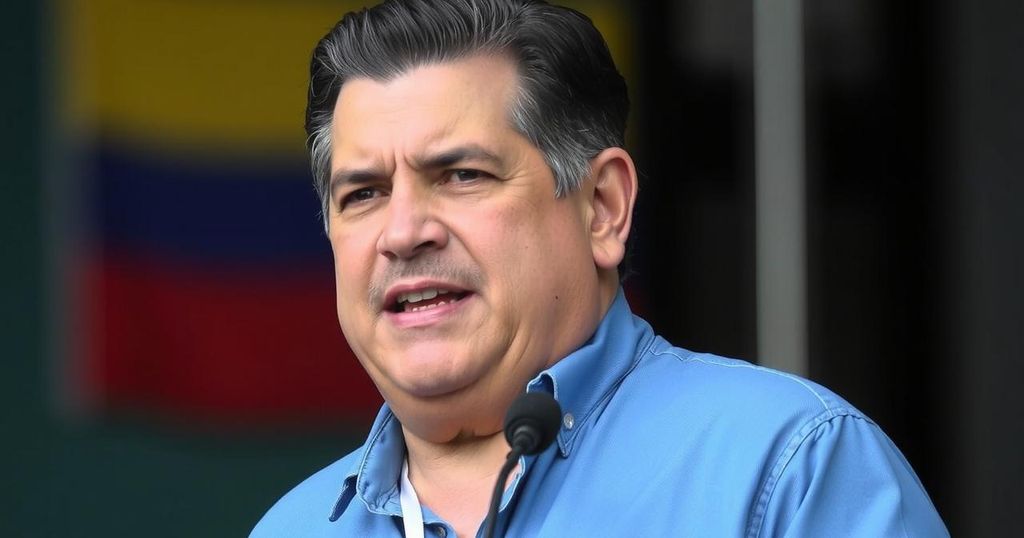Colombia Proposes Custody of Argentine Embassy Amid Venezuelan Political Crisis

Colombia has offered to manage Argentina’s embassy in Caracas, sheltering aides of opposition leader María Corina Machado amid increased tensions in Venezuela. The proposal aims to secure safe passage for the aides, contingent upon the release of individuals connected to the Venezuelan and Ecuadorian governments. The situation reflects Colombia’s heightened involvement in resolving Venezuela’s political impasse, where the crackdown on dissent continues to draw international criticism.
Colombia has proposed to manage Argentina’s embassy in Caracas, currently sheltering six aides of opposition leader María Corina Machado, amidst escalating tensions in Venezuela. Foreign Affairs Minister Luis Gilberto Murillo announced during a conference in San Andrés that discussions are ongoing with Venezuela’s government for the safe passage of these officials. This situation hinges on the conditional release of an unidentified individual linked to the Venezuelan administration and former Ecuadorian Vice President Jorge Glas, who was detained under controversial circumstances. Additionally, Maduro criticized the previous raid on the Mexican embassy in Quito as an act of ‘barbarism’ by Ecuador’s President Daniel Noboa.
The political climate in Venezuela has worsened following Nicolás Maduro’s disputed re-election, leading to increased hostilities against dissenters. The opposition aides have faced heightened police intimidation, leading them to seek refuge in the Argentine embassy since March due to threats of arrest. Recently, the Venezuelan police have escalated their tactics, employing power cuts and water shortages as measures of coercion, which the United Nations has classified as violations of international law. The aides include key figures such as Magalli Meda and close advisors to Machado.
The diplomatic scenario is further complicated by the ongoing disagreements between Venezuela and Brazil. Following Argentina’s severance of diplomatic ties with Venezuela, Brazil assumed control of the Argentine embassy but stated it continues until Argentina appoints a replacement. Even though Brazil’s President Luiz Inacio Lula da Silva has not recognized Maduro’s victory and has urged for transparency in the electoral process, recent diplomatic engagements have resumed despite the discord.
Efforts by Colombia to be at the forefront of mediating this situation reflect its growing commitment to resolving the Venezuelan political stalemate, emphasizing the importance of international collaboration in safeguarding human rights and fostering political stability in the region. Meanwhile, Machado’s aides remain in a precarious position as they await the outcome of potential negotiations.
The geopolitical landscape in South America is complex. Colombia’s involvement in Venezuela’s political crisis marks a significant pivot from its traditional stance. The intensified crackdown on opposition figures following Maduro’s controversial re-election has drawn international scrutiny and condemnation. The shifting diplomatic relations, particularly between Venezuela, Argentina, and Brazil, underscore wider issues of human rights violations and the legitimacy of Maduro’s government. The detention of Jorge Glas, former Vice President of Ecuador, further complicates the matter, as it intertwines the political fates of multiple nations in the region. With significant humanitarian implications, the actions of the Venezuelan government and the response from neighboring countries serve as a critical focal point for ongoing dialogues regarding democracy and governance in Latin America.
In conclusion, Colombia’s offer to take custody of Argentina’s embassy represents a crucial development in the ongoing diplomatic discussions surrounding the Venezuelan political crisis. The entangled interests of various nations, the plight of opposition leaders, and rising tensions highlight the urgent need for a cohesive international response. As negotiations unfold, the commitment to human rights and democratic principles remains a central concern for all involved parties, emphasizing the delicate balance of diplomacy and sovereignty in the region.
Original Source: www.bnnbloomberg.ca







